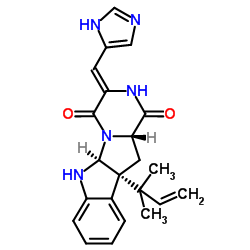Mycotoxin-forming ability of two Penicillium roqueforti strains in blue moldy tulum cheese ripened at various temperatures.
Ahmet Erdogan, Selahattin Sert
Index: J. Food Prot. 67(3) , 533-5, (2004)
Full Text: HTML
Abstract
Isolated and identified toxigenic and nontoxigenic Penicillium roqueforti (PR) strains from moldy tulum cheeses were inoculated into tulum cheeses made in the laboratory and ripened at 5 and 12 degrees C. Mycotoxin (patulin, penicillic acid, PR toxin, and roquefortine) formation in the control and mold-inoculated cheeses were detected by thin-layer chromatography on the first through fourth months of ripening. Patulin, penicillic acid, and PR toxin were not detected in the experimental cheeses. Only roquefortine was detected in cheese inoculated with the toxigenic strain of the mold and ripened at 5 and 12 degrees C on the third and first months of ripening, respectively. Toxin in cheeses ripened at 5 and 12 degrees C was 2.1 to 2.4 and 2.1 to 3.8 mg/kg cheese, respectively.
Related Compounds
| Structure | Name/CAS No. | Molecular Formula | Articles |
|---|---|---|---|
 |
isoroquefortine C
CAS:58735-64-1 |
C22H23N5O2 |
|
Novel key metabolites reveal further branching of the roquef...
2013-12-27 [J. Biol. Chem. 288(52) , 37289-95, (2013)] |
|
Determination of selected mycotoxins in mould cheeses with l...
2005-05-01 [Food Addit. Contam. 22(5) , 449-56, (2005)] |
|
A single cluster of coregulated genes encodes the biosynthes...
2011-11-23 [Chem. Biol. 18(11) , 1499-512, (2011)] |
|
Roquefortine/oxaline biosynthesis pathway metabolites in Pen...
2005-10-01 [J. Chem. Ecol. 31(10) , 2373-90, (2005)] |
|
LC-MS/MS screen for penitrem A and roquefortine C in serum a...
2006-07-01 [Anal. Chem. 78(13) , 4624-9, (2006)] |